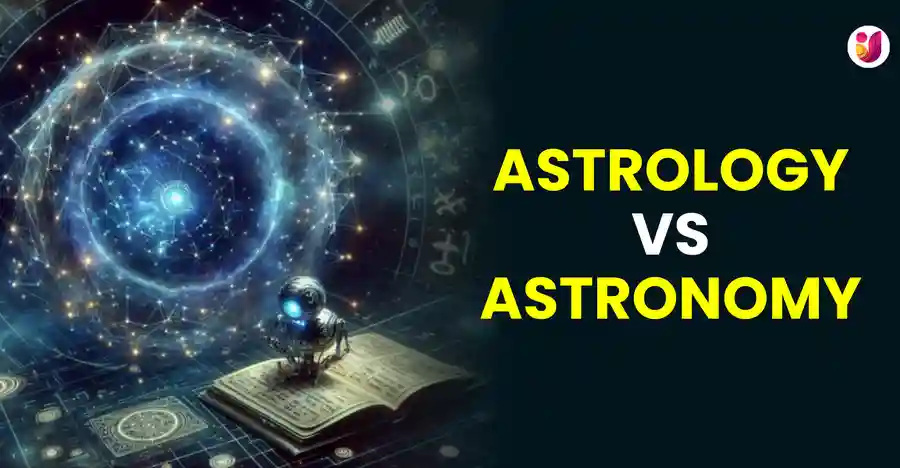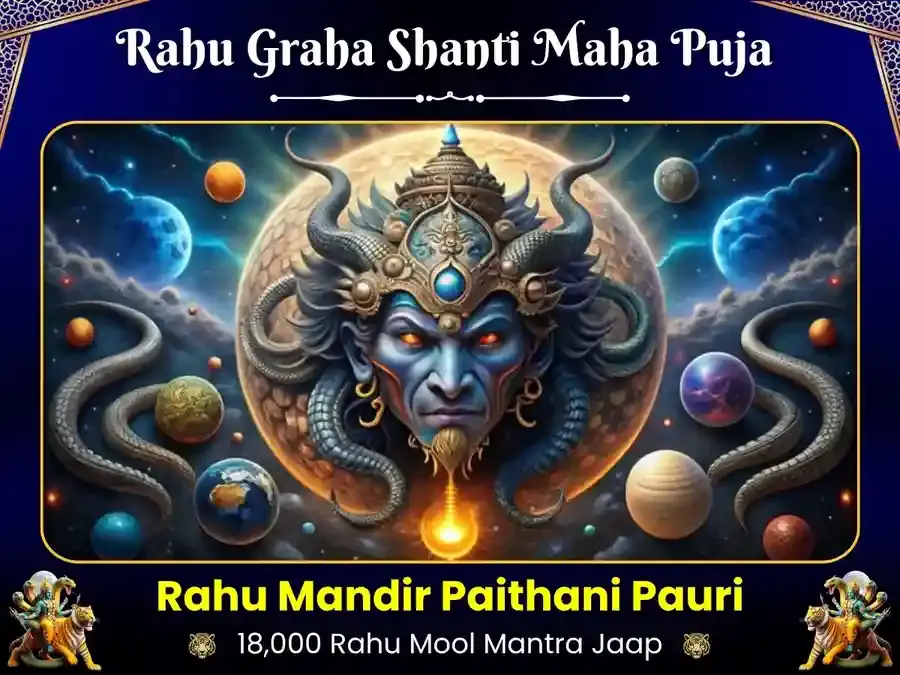Astronomy vs. Astrology: A Hindu Religious Perspective
Fri - May 09, 2025
3 min read
Share
Introduction
In Hinduism, the cosmos is not just a physical entity but a divine manifestation. While modern astronomy studies celestial objects through empirical methods, Hindu astrology (Jyotish) interprets planetary movements as reflections of divine will and karmic influence. Unlike the Western world, where astrology is often viewed as pseudoscience or entertainment, in Hinduism, Jyotish is a sacred discipline deeply embedded in religious practices, rituals, and daily life.
This blog explores how astrology functions in Hinduism as a spiritual guide, shaping decisions, rituals, and cultural traditions, while astronomy, though respected, remains secondary in religious significance.
1. Astrology (Jyotish) in Hinduism – A Sacred Science
1.1 Jyotish as a Vedanga
Jyotish is one of the six Vedangas (limbs of the Vedas), emphasizing its importance in Vedic tradition. It is not merely about predictions but about understanding cosmic rhythms and aligning human life with divine order.
1.2 The Three Branches of Jyotish
Siddhanta (Astronomy) – Calculates planetary positions for rituals.
Samhita (Mundane Astrology) – Predicts large-scale events like natural disasters and political changes.
Hora (Predictive Astrology) – Deals with individual horoscopes (Kundali) and life predictions.
1.3 Key Concepts in Hindu Astrology
Nakshatras (27 Lunar Mansions) – Each Nakshatra governs specific traits and is used in birth charts and rituals.
Dashas (Planetary Periods) – Determine favorable and challenging phases in life.
Graha Dosha (Planetary Afflictions) – Malefic planetary positions that require remedies like gemstones, mantras, or donations.
1.4 Religious Significance of Jyotish
Muhurta (Auspicious Timing) – No major Hindu ceremony (marriage, Griha Pravesh, naming a child) is performed without consulting an astrologer.
Karma & Planetary Influence – Hindus believe planetary positions reflect past karma, and remedies can mitigate negative effects.
2. Modern Usage of Astrology in Hindu Religious Life
2.1 Marriage & Kundali Milan
Horoscope Matching – Before marriage, the Kundalis (birth charts) of the bride and groom are matched for compatibility (Guna Milan). A minimum score (18/36) is often required.
Mangal Dosha (Mars Affliction) – If Mars is in the 1st, 4th, 7th, 8th, or 12th house, it is considered inauspicious. Remedies like Kumbh Vivah (symbolic marriage to a pot) are performed.
2.2 Festivals & Rituals Based on Astrology
Diwali, Navratri, and Eclipse Rituals – Dates are determined by planetary positions.
Solar & Lunar Eclipses (Grahan) – Hindus observe fasting, avoid cooking, and perform purification rituals due to the belief that negative energies are strong during eclipses.
2.3 Career & Financial Decisions
Business Inaugurations (Muhurta) – The opening of shops, new ventures, or property purchases are done on astrologically favorable days.
Gemstone Recommendations – Wearing gems like Ruby (Sun), Pearl (Moon), or Emerald (Mercury) is believed to strengthen planetary influences.
2.4 Birth & Naming Ceremonies
Namkaran (Naming Ceremony) – The child’s name is chosen based on the Nakshatra at birth.
First Mundan (Hair Cutting) – Performed at an auspicious time to ensure the child’s well-being.
2.5 Death & Ancestral Rituals
Shraddha (Pitru Paksha) – The timing of ancestral rites is determined by the lunar calendar to ensure peace for departed souls.

3. Astronomy in Hinduism – A Supporting Role
While astrology dominates religious practices, Hindu astronomy (Khagola Shastra) has contributed significantly to temple architecture and calendar systems.
3.1 Temple Architecture & Cosmic Alignments
Sun Temples (Konark, Modhera) – Designed to align with solstices and equinoxes.
Chidambaram Temple – Represents the cosmic dance of Lord Shiva (Nataraja), symbolizing the universe.
3.2 Panchang (Hindu Calendar)
Based on lunar and solar movements, it determines festivals, fasting days (Ekadashi), and agricultural activities.
3.3 Eclipses in Hindu Belief
Unlike astronomy, which explains eclipses scientifically, Hindus see them as spiritually significant, involving rituals like bathing in holy rivers and chanting mantras.
4. Why Astrology Thrives in Hinduism Despite Scientific Criticism
4.1 Faith Over Empirical Proof
Jyotish is considered a divine science (Daiva Vidya), beyond materialistic validation.
Many Hindus follow astrological advice out of tradition and faith, not scientific proof.
4.2 Psychological & Spiritual Comfort
Provides guidance in uncertainty (marriage, career, health).
Remedial measures (Upayas) give a sense of control over destiny.
4.3 Deep Cultural Integration
From birth to death, astrology is involved in every major life event.
Reinforced by religious leaders, making it an inseparable part of Hinduism.
Conclusion
In Hinduism, astrology is not just a belief but a way of life deeply connected to karma, divinity, and cosmic order. While astronomy provides the calculations, Jyotish gives them spiritual meaning, guiding millions in their daily lives.
Unlike the West, where astrology is often dismissed, in Hinduism, it remains a sacred tradition—proving that for devotees, the stars are not just celestial bodies but divine messengers of fate.
Share
Offer Puja to Ganeshji
🪔
Puja for Wealth, Fame & Power
Shanivar Vishesh Rahu Shanti Mahayagya & 18000 Mool Mantra Jaap
Rahu Paithani Temple, Paithani
Sat - Sep 13, 2025 - Shanivar Visesh
5.9k+ Devotees